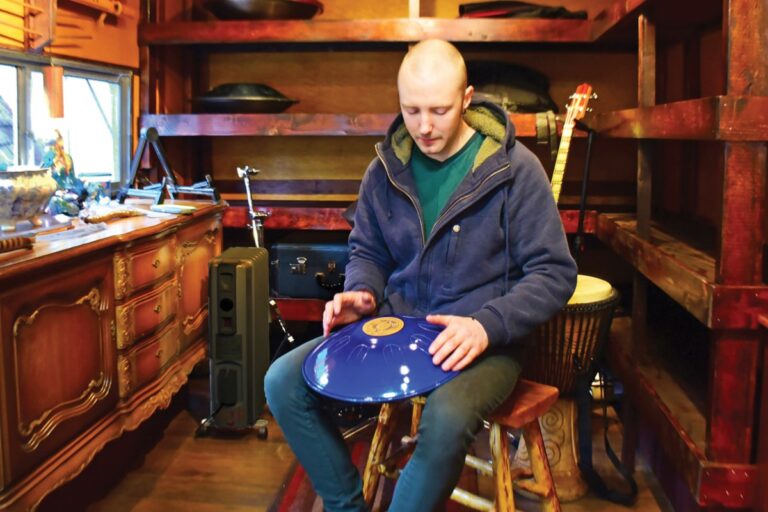A Roberts Creek craftsman and entrepreneur has inked a potentially very lucrative deal with Canada’s largest musical instrument retailer to begin selling his own instruments in the company’s stores.
For more than four years, Bryn Klingwall has been producing hundreds of “melodic steel instruments” each year from his garage-sized workshop on Flume Road, selling them online and in a few small music stores under the name Kindred Spirit Steel Drums. Now national retailer Long & McQuaid has agreed to start carrying his growing line of metal drums.
Klingwall didn’t have to knock on the doors of retail giants; it came to him. “I don’t know how they found me,” he said in an interview. “Maybe my customers in Ontario asked why I didn’t have my instruments in stock. So I [Long & McQuade] Test shipments have been made and now larger quantities have been ordered for distribution in even more stores.”
Klingwall initially received help developing his business through Sunshine Coast Community Futures’ Local Entrepreneurship Advancement Program (LEAP) in 2015. Since then, he has been handcrafting steel tongue drums, measuring 20-30cm (8-12 inches) in diameter, and larger metal drums called handpans, measuring about 50-58cm in diameter. But the word “drum” is misleading: when you strike them with your fingers or soft mallets, you hear a subtle musical tone, not a drumbeat or metallic sound. You can buy instruments with a range of sound qualities and several keys and scales.
“People have more freedom to express themselves musically because there are no wrong notes,” Klingwall said. “They can play freely.”
As an amateur musician, Klingwall plays music whenever he can, which is rare: “I’m usually too busy to play, but I’ll play shows or I’ll play at yoga studios. It gives me a little break.”
There will be even fewer such opportunities in the near future, with the busy Christmas season approaching and orders for Long & McQuaid to be fulfilled. Plus, Klingwall has started using a different manufacturing method for his small steel tongue units, the spun steel process, made in Vancouver. Previously, they were made from discarded propane tank caps, recycled under an agreement with a local landfill. But Klingwall says it makes the product even better: “The tonally consistent material is more consistent.”
Klingwall was surprised by his retail breakthrough, but he credits his technology’s success to a dogged, methodical approach. “This is something I’ve been working on for years, and it’s been a slow win,” he says. “If I’m going to be super successful in the long term, this deal will be the catalyst.”

